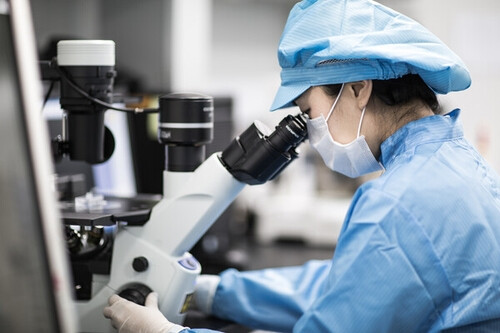
The recent emergence of Deepseek, a Chinese generative AI, has reignited interest in this technology within the Korean healthcare industry. While concerns about security breaches, including personal data leaks, are growing, the trend of actively adopting generative AI continues due to its potential in areas such as new drug development and service improvement.
According to industry reports, the market size of generative AI in the healthcare sector is expected to grow at an average annual rate of 32.6%, from $1.8 billion (about 2.6 trillion won) in 2023 to $22.1 billion (about 32 trillion won) by 2032. Major global consulting firms predict that generative AI will accelerate the process of identifying, developing, and approving new drug compounds in the pharmaceutical and medical products industry.
In particular, the Korean bio industry association evaluated that generative AI has a high contribution to the new drug development field. Generative AI models support new drug development by generating new small molecules, nucleic acid sequences, and proteins with desired structures or functions. It can also produce potential drug candidates at a faster rate than existing drug methods by analyzing successful drug chemical structures and simulating variations.
In addition, it can predict the efficacy and safety of new drugs, accurately find new targets for drug development, and help develop effective treatments. It can also be used to design and modify complex clinical trials. By analyzing large-scale patient data, it is possible to select a target group suitable for clinical trials and present elements necessary for trial design, thereby increasing the efficiency of clinical trials.
The introduction of multimodal large language models (LMMs), which are AI models that analyze and process various data such as text, voice, images, and videos, can help detect early signs of clinical deterioration such as sepsis and modify or stop trials.
In fact, Korean pharmaceutical, bio, and medical device companies are rapidly entering the generative AI market. Samsung Biologics invested in Generate Biomedicine, a US bio venture company with protein design technology using generative AI, at the end of last year. The purpose is to invest in companies with a high potential for deriving new drug candidates, establish cooperative relationships such as contract manufacturing (CMO) and joint development in the future, and promote AI-based business growth.
SK Biopharm announced last month that it will establish a joint venture (JV) in the US with Europharma, one of the largest pharmaceutical companies in South America, and commercialize an AI-based epilepsy management platform. The plan is to use its own developed brainwave analysis AI technology and brainwave measurement wearable device technology to monitor whether epilepsy seizures occur in real time and support the establishment of treatment plans based on medical staff data.
Deepnoid, a medical AI company, has already developed its own generative large-scale language model operation (LLMOps) platform 'DEEP:GEN'. In particular, Deepnoid recently started updating medical AI services by applying the Deepseek inference model 'R1' to DEEP:GEN. DEEP:GEN with R1 applied learns to enable optimal medical decision-making even with small data and continuous environmental changes. For example, when DEEP:GEN is used in hospital A, the AI learns by itself according to the medical environment of hospital A and gradually optimizes.
Healthcare startup Sumit AI applied for clinical trial approval for its chest X-ray draft reading software 'AIRead-CXR' at the end of last year. The software is a generative AI-based medical device that provides personalized draft readings and abnormality probabilities for various findings that can be detected on chest X-rays (CXR) to radiology medical staff.
However, concerns are also being raised regarding the use of generative AI in the pharmaceutical and bio industries. One of the disadvantages of generative AI is the 'hallucination' phenomenon, in which, if it cannot find an accurate answer, it groups only similar parts of the learning content and provides incorrect information. Therefore, experts say that experts such as medical staff must review the results before they are distributed to patients.
Problems with personal information leakage related to patient medical data collected by generative AI are also highlighted. Currently, Samsung Biologics has blocked AI-related sites such as ChatGPT since last year, and immediately blocked Deepseek after its launch. Yuhan Corporation does not use generative AI such as Deepseek and ChatGPT within the company for security reasons, and Daewoong Pharmaceutical decided to block Deepseek access from employees' work PCs from the 6th. Kakao Healthcare also recently informed its employees that it is refraining from using Deepseek for internal work purposes according to its AI internal use policy. Celltrion is preparing internal guidelines for the use of artificial intelligence such as Deepseek.
The Korea Bio Association said, "Inaccurate diagnosis and treatment due to the use of AI can threaten individual health and cause problems with decision-making responsibility and confusion in the medical field," and urged that specific regulations be prepared for generative AI used in the field.
[Copyright (c) Global Economic Times. All Rights Reserved.]






























